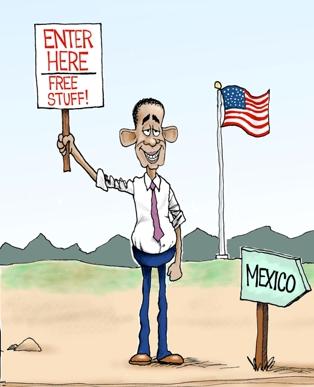“By July 1 of this year, if all goes well, we will know one way or the other whether [the Deferred Action for Childhood Arrivals(DACA) and Deferred Action for Parents of Americans and Lawful Permanent Residents (DAPA)] can go forward.”
That was The Atlantic writer Garret Epps in Jan. 2016, hopeful that with United States v. Texas the Supreme Court would answer all the issues of to do with President Barack Obama’s executive amnesty for millions of illegal immigrants with children that are U.S. citizens.
But all hasn’t gone well. In fact, since this piece was written, Justice Antonin Scalia has passed away and the Supreme Court has entered into a state of gridlocked turmoil, preventing clear decisions from being made in key cases like this one.
United States v. Texas would appear to be a simple enough case on the surface. Through executive order in 2014, President Obama instituted both the expanded Deferred Action for Childhood Arrivals (DACA) and Deferred Action for Parents of Americans (DAPA), allowing illegal immigrants to reside within the country for several years and continue to work. The state of Texas filed suit against the Administration claiming President Obama lacks authority to implement this policy, and opted for an injunction, or the right to refuse implementation of the law.
While as Epps eluded, a decision on the amnesty is much needed, the Supreme Court must first work to grant legitimacy to the injunction. As Amy Howe of the SCTOUS Blog explains “before the Supreme Court can weigh in on [the policy] question, it will also have to agree that states have the legal right, known as ‘standing’ to challenge the policy at all.”
The state of Texas once again has the burden to prove a significant cost associated with the implantation of DACA and DAPA in order to prove they have standing to reject the executive order; this ensures states do not simply neglect the law the President enacts out of disagreement.
Texas efficiently proved this at both the district court and 5th Circuit Court of Appeals levels. Council on Hemispheric Relations, a leader in American immigration research, reporter Jennalee Beazley explains, “states believe they can sue based on the financial burden that the state of Texas will incur from giving approximately 500,000 driver’s licenses to the recipients of these programs.”
Only if the Supreme Court agrees with the view that Texas has legitimacy in suing the administration, is it then possible for the case to return to the lower courts to be reviewed for the actual content of the amnesty.
This puts the Supreme Court in a vital position. In Scalia’s absence, the court has the possibility for a 4 to 4 split decision, which would effectively uphold the position of the lower courts, which was that Texas had standing to raise the suit. If this occurs and Texas is granted their standing, the lower courts will have a go at the merits of the case, with that decision likely coming back to the Supreme Court — some time during the next presidential administration.
Meaning, assuming a 4 to 4 split on this case, whoever chooses the next Supreme Court Justice, either Donald Trump or Hillary Clinton, may very well be the one who ultimately answers the hard questions about the Obama amnesty program.
Texas maintains that President Obama’s actions violate his executive authority, saying he is changing the law rather than enforcing it. In doing this, President Obama is being accused of violating the Take Care Clause of the Constitution, Section 2, Article 3. The Find Law Center for Legal Professors explains this as “the Constitution does not say that the President shall execute the laws, but that ‘he shall take care that the laws be faithfully executed’ i.e. by others.”
This distinction ensures that by instituting an executive action such as DAPA and DACA, which reaches hundreds of thousands of immigrants, President Obama is not simply failing to enforce the law, but again, is creating a new law.
The Stanford Daily of April 2016 explains the importance of this decision, if the full case on the laws itself make it to the Supreme Court “the decision may affect the separation of powers between the executive and legislative branches, federalism, and the legal status of millions of individuals.”
However, in the event that the Supreme Court does not grant standing to Texas, all of these questions will remain unanswered — with little hope that another case will ever resurface with a full court to actually hear the issue. The President’s actions granting amnesty to millions of illegal immigrants may be fully unconstitutional, but if nobody has the standing to sue in court, the case will be effectively insulated from judicial scrutiny.
That makes the issue of standing — whether states can challenge the amnesty — a critical one to determining whether the separation of powers still has any meaning.
Natalia Castro is a contributing editor Americans for Limited Government.







